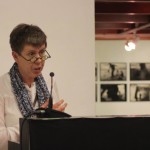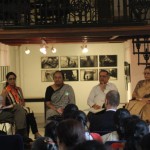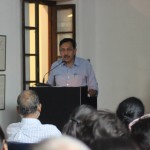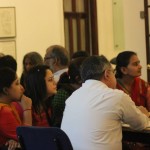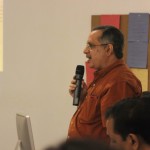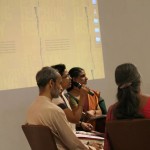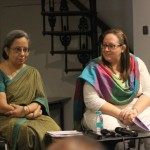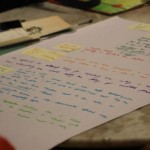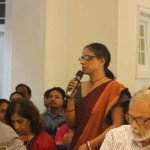The International Conference on Teaching History took place on the 30th and 31st of July and the 1st of August 2015 in Kolkata.
A platform for exchanging thoughts and ideas and learning, the conference combined panel discussions and workshops. It also showcased alternative work in the arts, in education and civil society opening up possibilities of bringing these into the classroom. Topics ranging from the technicalities of textbook writing, protocol to be followed when taking an oral history interview to slightly more complex questions such as what is the best method of teaching history, if there is one at all, were discussed.
Starting with a keynote address by Dr Barbara Christophe, from the Georg Eckert Institute, Germany, who spoke about the importance of memory, the first day saw panel discussions in the morning. Dr Mubarak Ali joining us over Skype from Lahore spoke about the 5 distinct phases of the historiography of Pakistan. Dr Ayaz Naseem joined us from Montreal, also over Skype, no small feat considering the time difference! He spoke about the role of textbooks in Pakistan when it came to constructing the Indian ‘other’. Dr Vishwamohan Jha examined the construction of identities over the years, with reference to work done by textbook writers and historians. Shreya Ghosh gave us the Bangladeshi perspective, drawing comparisons between accounts of single events in history in different textbooks.
The second panel discussion delved deeper into textbook writing and the NCERT based on a talk given by Prof Anil Sethi and what is meant by an ‘Inclusive’ history, based on the work done by Prof Afsan Chowdhury. Swaleha Shahzada of the Citizens Archive of Pakistan spoke about the work that they do in Karachi and other parts of Pakistan, while Dr Shubra Chatterji of Vikramshila Education Resource Society spoke about the work that they do in Madrassas and the project that they had done in West Bengal, teaching history to the children, using the community as the starting point.
After lunch, there were two workshops- one based on the World café methodology followed by one by Prof Anil Sethi who discussed the fine art of questioning, how to examine and teach history like a historian approaches the study of history- how is history done?
The World Café involved the participants divided into 6 groups, each group with a discussion leader and a volunteer. Each group was given a few topics or questions to discuss and half an hour to discuss it in, after which they moved onto a new table. This allowed the participants to really sink their teeth into topics pertinent to the conference, and education in general. Topics included:
1. Why do we teach history?
2. How objective can one be while teaching history?
3. Can history teaching instil values?
4. The role of textbooks in shaping mindsets.
Other topics discussed included religion and bias in the classroom. The conversations at each of the tables threw up some interesting points, with educators agreeing on some and agreeing to disagree on others.
Day 2 began with a keynote address by Mrs Devi Kar, Director of the Modern High School for Girls, Kolkata. Mrs Kar highlighted the importance of the role of teachers, and also how the conference bridges the gap between academicians and teachers.
Following this, case studies from across the world to showcase how contentious histories can be taught were discussed. Dr Christophe spoke about the Franco German, the German Polish and the Israeli Palestine common history textbooks. She spoke about the historical background, the process by which the textbooks were developed, the pitfalls and the successes. Qasim Aslam, the co founder of The History Project, Pakistan joined us over Skype to tell us about the development of a history resource that compares accounts of historical events in both India and Pakistan. Megha Malhotra from PeaceWorks introduced the Teaching Divided Histories project, followed by which, Tina Servaia and Sunita Biswas spoke about implementing the project in each of their schools.
The afternoon session saw a discussion on History as it is taught in Krishnamurti schools, with Akhila Seshadri speaking about the importance of field visits and how they can be used as pedagogical tools, G. Devika discussing the philosophy behind education, and Krishna Menon speaking about curriculum development and the environment being a part of the history curriculum.
This was followed by the screening of films by INPUT and a performance by a group of young theatre artistes from Kolkata.
Following a keynote by Urvashi Butalia, who spoke about her experiences conducting oral history interviews of people affected by partition, the first half of day 3 included a presentation by Swaleha Shahzada on how they collect and use oral histories as a way of bringing history to the children in Government schools in Pakistan. Aditi Banerjee from Srishti Institute of Art, Design and Technology spoke about a project that her students at the institute are involved in, dealing with personal and collective memory with respect to the Partition and the 1984 riots in Punjab.
The afternoon was devoted to workshops conducted by resource people from Kolkata, Bangalore, Delhi and Canada. These were conducted with the primary aim of equipping teachers with further tools to push the envelope, making history teaching and learning fun and exciting.
–Paroma Sengupta
–Paroma Sengupta

